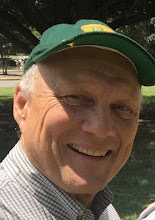We walked today where few westerners have ever been--in the deep recesses of the market in Nima. These gracious and beautiful African people allowed us to trudge through their world in single file. We walked wide-eyed down narrow dirt paths that divide hundreds of small businesses into a giant maze of astonishing sights and sounds.
The unexpected we encountered at every step--a sawmill humming in the middle of the maze, a flour mill with white-powdered boys filling sacks, a pungent spice mill, a meat market with everything available raw or cooked, a vegetable market, and so much more all crowded and carved into the vacant urban land.
Our presence was strange to the many merchants who saw us. They seldom if ever see people like us walking those trails. Yet they greeted us with wide smiles, using their English and interacting as they could. We paused to talk along the way.
I bought a Muslim prayer mat hoping it will remind me to pray for these dear people. When the Muslim call to prayer sounds out through the maze, only a few people stop to pray. The vast majority go on with their work or discussions even those you would expect to observe the moment of prayer. Islam here, like Christianity in the USA, is often more cultural than it is devotional.
People were curious about us being Americans. Our nationality is not at all obvious to them. They think first we are European. Neither our dress nor our dialect necessarily give us away. When they learn we are American, we often hear "Obama!" His name is known widely here, and people are enthusiastic about him. Some wear t-shirts with his picture and hang Obama posters in their shops.
American music can be heard on street corners and in shops, even Lil Wayne. "New York" hats and Celtics t-shirts are fairly common. We have not picked up on any anti-American sentiment in Ghana though it may be here somewhere.
Taking pictures is problematic. The camera takes you out of the flow of humanity and objectives the people you are seeking to befriend. One team member was pelted with peppers when she innocently snapped a picture in a marketplace. Some are excited to be photographed but other are wary and even angry when they see the camera. We have often left them hidden when we longed to capture on film those giant snails or that boy dusted with flour or that enormous pile of citrus beside the road or the man at the grinder covered with spice. We ask permission before we snap, but even then onlookers may object.
We continue to pray for avenues of continuing engagement with the Songhai people. Our objectives would be to 1) befriend them, 2) help them in appropriate ways, and 3) introduce them to Jesus, our Savior and Lord.
Poverty and deprivation look similar to me whether in Latin America, Asia, or Africa. People whom Jesus loves need medical attention, education, and jobs. We want to be wise in our relationships with the Songhai. We are beginning to feel as a team that this may be God's calling for us. No other Christian church, as far as we know, is reaching out to the migrant population of Songhai in Accra. They are largely invisible even to the locals, but we have met and seen hundreds of Songhai here.
We are about to leave to visit with the onion boys. Their ages range from 12 to 26. They sell onions by the side of the road. We look forward to talking with them again and learning more about Zarma. Maybe they will learn a little English--and a little more about Jesus--from us today.
Monday, July 12, 2010
Subscribe to:
Post Comments (Atom)




No comments:
Post a Comment